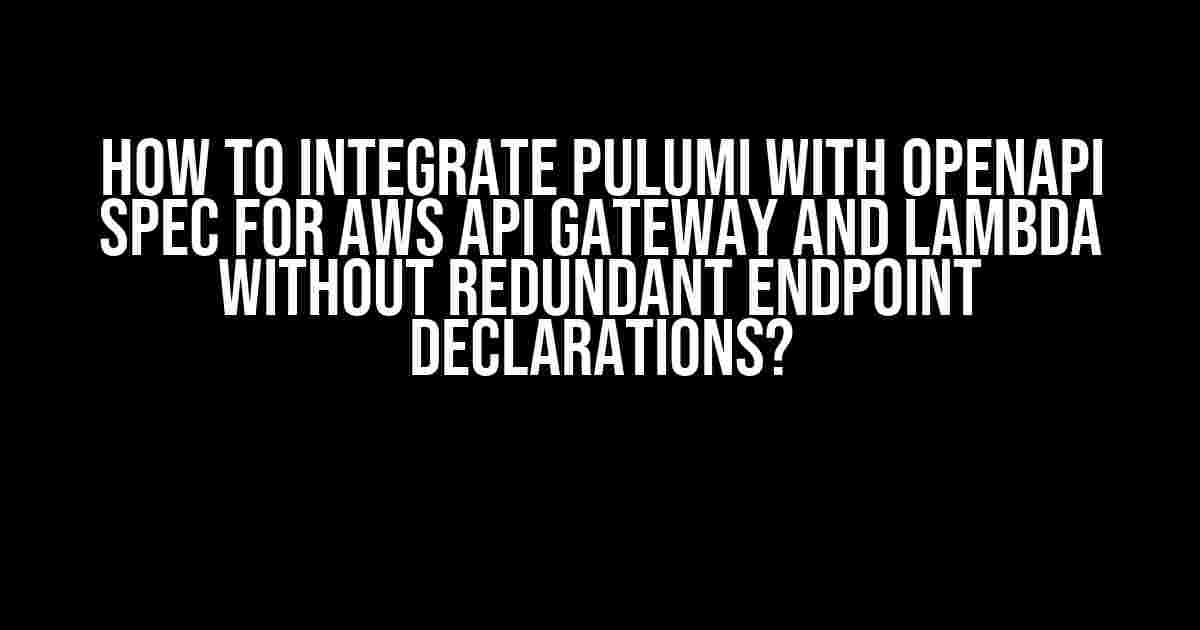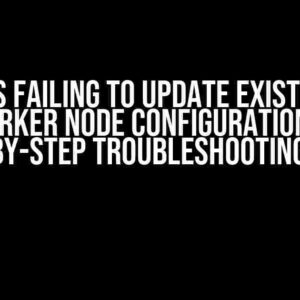Are you tired of dealing with redundant endpoint declarations when integrating Pulumi with OpenAPI spec for AWS API Gateway and Lambda? You’re not alone! In this comprehensive guide, we’ll show you how to simplify your infrastructure-as-code (IaC) experience by leveraging Pulumi’s OpenAPI integration and AWS API Gateway/Lambda features.
What is Pulumi?
Pulumi is an open-source infrastructure-as-code (IaC) platform that allows you to define and manage cloud infrastructure using programming languages like TypeScript, Python, Go, and C#. It provides a unified way to manage infrastructure across multiple cloud providers, including AWS, Azure, Google Cloud, and more.
What is OpenAPI Spec?
OpenAPI Specification (OAS) is an industry-standard API description format that allows developers to define, document, and visualize RESTful APIs. It provides a machine-readable definition of an API, making it possible to generate client code, documentation, and even deploy APIs on various platforms, including AWS API Gateway.
Why Integrate Pulumi with OpenAPI Spec?
Integrating Pulumi with OpenAPI spec offers several benefits, including:
- Streamlined API development: With Pulumi, you can define your API infrastructure using OpenAPI spec, eliminating the need for redundant endpoint declarations.
- Version control: Pulumi’s integration with OpenAPI spec enables you to manage your API infrastructure as code, making it easier to track changes and collaborate with team members.
- Consistency: By using OpenAPI spec, you can ensure consistency across your API documentation, client code, and infrastructure.
Prerequisites
Before we dive into the integration process, make sure you have the following prerequisites in place:
- Pulumi installed on your machine (CLI or SDK)
- An AWS account with API Gateway and Lambda enabled
- OpenAPI spec file (in YAML or JSON format)
Step-by-Step Integration Guide
Now, let’s walk through the step-by-step process of integrating Pulumi with OpenAPI spec for AWS API Gateway and Lambda:
Step 1: Create an OpenAPI Spec File
Create a new file named `openapi.yaml` (or `openapi.json`) and add the following content:
openapi: 3.0.2
info:
title: My API
description: My API description
version: 1.0.0
paths:
/hello:
get:
summary: Hello World
responses:
200:
description: Hello World response
content:
application/json:
schema:
type: string
This OpenAPI spec defines a simple API with a single endpoint `/hello` that returns a “Hello World” response.
Step 2: Create a Pulumi Project
Create a new Pulumi project using the CLI or SDK:
pulumi new aws-typescript --name pulumi-openapi-integration
This will create a new Pulumi project with the required files and dependencies.
Step 3: Install Required Dependencies
Install the required dependencies, including the Pulumi AWS provider and OpenAPI plugin:
npm install @pulumi/aws @pulumi/openapi
Step 4: Define the API Gateway and Lambda Resources
In your Pulumi project, create a new file named `index.ts` (or `index.py`, `index.go`, etc. depending on your language of choice) and add the following code:
import * as pulumi from "@pulumi/pulumi";
import * as aws from "@pulumi/aws";
import * as openapi from "@pulumi/openapi";
// Create an AWS provider
const provider = new aws.Provider("aws", {
region: "us-west-2",
});
// Create an API Gateway
const api = new aws.apigateway.RestApi("my-api", {
name: "My API",
description: "My API description",
});
// Create a Lambda function
const lambda = new aws.lambda.Function("my-lambda", {
runtime: "nodejs14.x",
handler: "index.handler",
code: pulumi.assetArchive({
"index.js": pulumi.stringAsset(`
exports.handler = async () => {
return { statusCode: 200, body: JSON.stringify({ message: "Hello World!" }) };
};
`),
}),
});
// Create an OpenAPI spec
const openapiSpec = new openapi.Spec("openapi", {
filePath: "openapi.yaml",
});
// Create an API Gateway deployment
const deployment = new aws.apigateway.Deployment("my-deployment", {
restApi: api,
stageName: "dev",
});
// Create an API Gateway integration with Lambda
const integration = new aws.apigateway.Integration("my-integration", {
restApi: api,
resourcePath: "/hello",
httpMethod: "GET",
integrationHttpMethod: "POST",
type: "LAMBDA",
uri: pulumi.interpolate`arn:aws:apigateway:${provider.region}:lambda:path/2015-03-31/functions/${lambda.arn}/invocations`,
});
This code defines an AWS provider, API Gateway, Lambda function, OpenAPI spec, API Gateway deployment, and an API Gateway integration with the Lambda function.
Step 5: Deploy the Infrastructure
Run the following command to deploy the infrastructure:
pulumi up
This will deploy the API Gateway, Lambda function, and OpenAPI spec to your AWS account.
Step 6: Verify the Integration
Use a tool like `curl` to verify that the API is working as expected:
curl https://<api-id>.execute-api.<region>.amazonaws.com/dev/hello
This should return a “Hello World!” response.
Benefits of the Integration
By integrating Pulumi with OpenAPI spec, you’ve achieved the following benefits:
- No redundant endpoint declarations: Pulumi uses the OpenAPI spec to generate the API Gateway endpoints, eliminating the need for manual declarations.
- Version control: Your API infrastructure is now managed as code, making it easier to track changes and collaborate with team members.
- Consistency: The OpenAPI spec ensures consistency across your API documentation, client code, and infrastructure.
Conclusion
In this article, we’ve demonstrated how to integrate Pulumi with OpenAPI spec for AWS API Gateway and Lambda without redundant endpoint declarations. By following these steps, you can simplify your IaC experience and leverage the benefits of Pulumi’s OpenAPI integration.
Remember to explore Pulumi’s extensive documentation and community resources for more advanced use cases and best practices.
| Resource | Link |
|---|---|
| Pulumi Documentation | https://www.pulumi.com/docs/ |
| OpenAPI Specification | https://swagger.io/specification/ |
| Pulumi OpenAPI Plugin | https://github.com/pulumi/pulumi-openapi |
Happy coding, and don’t forget to share your Pulumi OpenAPI integration experiences with the community!
Frequently Asked Question
Get ready to uncover the secrets of integrating Pulumi with OpenAPI Spec for AWS API Gateway and Lambda without redundant endpoint declarations!
Q1: What is the main benefit of using OpenAPI Spec with Pulumi for AWS API Gateway and Lambda?
The main benefit is that it allows you to define your API specification once and reuse it across multiple environments and deployments, eliminating the need for redundant endpoint declarations. This makes your infrastructure-as-code (IaC) configurations more efficient, consistent, and scalable!
Q2: How do I generate an OpenAPI Spec for my AWS API Gateway and Lambda using Pulumi?
You can use Pulumi’s built-in `openapi` module to generate an OpenAPI Spec from your AWS API Gateway and Lambda configurations. Simply define your API resources and methods using Pulumi’s AWS provider, and then use the `openapi` module to generate the OpenAPI Spec.
Q3: Can I use an existing OpenAPI Spec with Pulumi for AWS API Gateway and Lambda?
Absolutely! If you already have an OpenAPI Spec, you can import it into your Pulumi configuration using the `openapi` module. This allows you to leverage your existing API specification and manage your AWS API Gateway and Lambda resources using Pulumi.
Q4: How do I avoid redundant endpoint declarations when using Pulumi with OpenAPI Spec for AWS API Gateway and Lambda?
To avoid redundant endpoint declarations, define your API resources and methods using Pulumi’s AWS provider, and then use the `openapi` module to generate the OpenAPI Spec. This way, you only need to declare your endpoints once, and Pulumi will automatically generate the necessary configuration for your AWS API Gateway and Lambda.
Q5: Are there any Pulumi resources or tutorials available to help me get started with integrating OpenAPI Spec with AWS API Gateway and Lambda?
Yes! Pulumi provides extensive resources and tutorials to help you get started with integrating OpenAPI Spec with AWS API Gateway and Lambda. Check out Pulumi’s official documentation, tutorials, and examples on GitHub, and join the Pulumi community for support and guidance.



